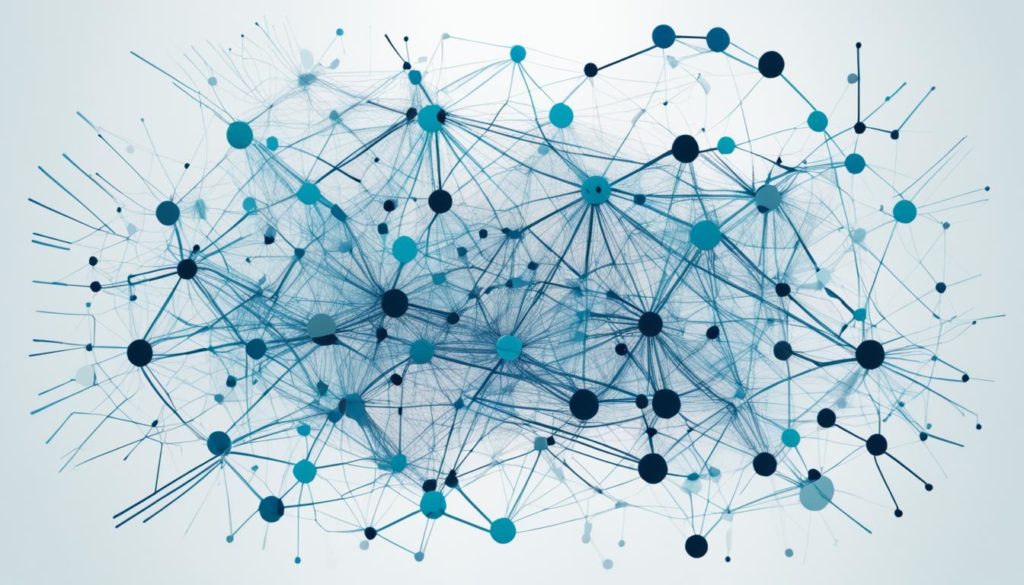
A striking 73% of AI ethics stakeholders emphasize the need for a sound AI ethics code. This code helps us navigate through issues like bias, privacy breaches, and environmental concerns. As caretakers of Generative AI Ethics, we view these statistics as more than numbers. They are a call to action for the ethical development of AI and responsible tech use.
In today’s world, ethics in artificial intelligence go beyond just theory. Giants such as IBM, Google, and Meta represent 36% of the tech industry. They are boosting their ethics pledges by creating teams focused on data ethics.
Our aim is to support the 58% of industries in tech, banking, and healthcare that uphold AI ethics. With guidance from the National Science and Technology Council and UNESCO’s global ethics accord, alongside the Asilomar AI Principles, we’re ready. This readiness is to push forward with responsible innovation. It’s an effort that acknowledges risks like Amazon’s bias issue, reminding us to stay alert against such biases.
Key Takeaways
- A strong AI code of ethics is crucial to prevent bias, protect privacy, and reduce environmental harm.
- Industry leaders are taking noticeable steps towards establishing ethical guidelines and teams to oversee AI development.
- Global initiatives and principles are setting the foundations for a united approach to artificial intelligence ethics.
- Inclusivity and fairness in technology are non-negotiable, highlighted by the backlash against biased AI recruiting tools.
- The environmental sustainability of AI models is becoming an increasingly important aspect of tech ethics.
- We have a collective responsibility to ensure AI technologies advance in a morally sound and ethical direction.
The Emergence of Generative AI and Ethical Foundations
The world of artificial intelligence is growing fast. With it, generative AI brings great opportunities and ethical challenges. Our focus on Generative IAI Ethics keeps us on track in tech innovation.
The Rise of Generative Algorithms and Responsible Innovation
Generative AI has changed many fields, like content creation and data analysis. It uses machine learning to do new things. We need solid ethics to guide these advances. By following ethical rules, we ensure that progress helps everyone.
Collaborative Efforts in Shaping Ethical AI Development
Managing AI well is crucial. We work with experts to make AI safe and ethical. This teamwork makes sure AI is used right, avoiding abuse of its power.
Fostering AI Transparency and Accountability
We aim for clear and accountable AI development. Experts and rules help keep AI in check. They make sure AI works as it should, based on ethics. Our training programs focus on artificial intelligence ethics, empowering professionals to stay ethical in their work.
We’re committed to promoting Generative AI Ethics in all technology areas. We want tech advances to do good and be ethically strong. Our efforts aim to make technology reach its best use without losing our values.
Generative AI Ethics: Balancing Benefits and Risks
In the fast-paced world of tech, Generative AI Ethics is key. It helps balance the benefits and risks of new tools. With AI like ChatGPT and Copilot in business, making ethical choices is crucial. These tools boost productivity but also raise concerns about data safety and content authenticity.
The spread of false info by AI systems is a big issue. It’s tough to tell apart human and AI-made content. Thus, sticking to tech ethics is vital. It ensures respect for intellectual rights, privacy, and fairness in AI outputs.
For risk management, businesses should have solid AI governance strategies. This includes setting high standards and keeping humans involved in decision-making. Having policies for external fact-checks can help prevent AI errors and deepfakes.
Following Generative AI Ethics has great benefits. Ethical firms are trusted more, improving customer relations and efficiency. Using AI ethically reduces risks and leads to innovation.
Let’s stay careful and ethical with Generative AI. Doing so keeps our tech advances aligned with our moral values. Discover how to create strong ethical practices in Generative AI to protect against digital dangers.
Building Inclusivity and Fairness in AI Algorithms
In the area of Generative AI Ethics, we emphasize the need for ethical algorithms. These should reflect our society’s diversity. We aim to develop responsible technology that reduces bias and increases fairness. We use strategies that value diversity and inclusion to set ethical bases in AI use.
Combatting Biases and Enhance Diversity in AI Models
We work hard to make AI models without bias. Biases can slip into AI during its creation. These can lead to unfair healthcare and recruitment practices. Our plan is to carefully check training data and keep a constant eye on biases. Thus, our AI can fairly serve everyone.
Integrating Intersectional DEI Principles in AI Technologies
We trust in the role of intersectional DEI principles for ethical AI development. Adding these principles means both tech changes and a cultural shift. By valuing diverse opinions, we raise AI’s ethical standards. This makes AI better for various human needs.
Tools and Techniques for Unbiased AI Development
We use modern tools and methods to improve AI algorithms. Our goal is to remove unfair biases. We check data sets, apply fairness when training algorithms, and test AI with diverse data. This approach ensures AI is ethical and responsible.
Our work supports the big goals of Generative AI Ethics. We aim to create technology that honors human dignity and diversity. Applying these principles, we hope to make AI reliable and useful for everyone.
Learn more about our efforts in ethical AI at Building Inclusive AI: Addressing Bias and Promoting Fairness.
Navigating Legal Complexities in Generative AI
As Generative AI Ethics evolve, technology and ethics intertwine more. Centraleyes leads by expanding to cover all enterprise risks. This approach is crucial for data integrity and privacy in AI governance.
Copyright issues are becoming vital for companies and regulators. Partnering with Cybriant, like CyGov did, boosts our ability to navigate legal limits. It ensures intellectual property safety and promotes innovation.
Learning from cybersecurity experts like Chris Lockery and Tony Velleca guides our AI governance. Recognizing ISO 42001’s role in AI reflects our commitment to strong cybersecurity.
With top risk and privacy tools of 2024, we tackle AI’s legal challenges. Our forward-thinking in AI governance leads to safe and ethical AI use.
Explore how Centraleyes leads in adapting AI strategies
It’s all about addressing new risks, meeting legal standards, and encouraging ethical innovation.
Conclusion
We are at the forefront of a major shift. The rise of Generative AI Ethics is a sign of our united effort. It combines the beauty of new inventions with the must-haves of ethical development. We don’t just get rules from this; we get a moral guide for technology’s future.
Tech ethics in Generative AI make sure these new technologies reach their full potential safely. Everyone—tech experts, lawmakers, and the public—plays a part in this. This joint effort is how we build a tech world that is responsible, open to all, and truthful.
We’ve set the stage with the rules and talks around Generative AI Ethics. Now, let’s move forward together, aiming for a future where AI’s creativity meets our moral goals. Our hard work makes a future where technology not only makes life easier but also honors and improves who we are as a society.
FAQ
What is Generative AI Ethics?
Generative AI Ethics deals with the principles guiding generative artificial intelligence’s creation and use. It focuses on upholding moral values, preventing harm, promoting fairness, and benefiting society. Topics include responsible innovation, reducing biases, and ensuring transparency and accountability.
Why is ethical AI development important?
Making AI ethically is key because it respects human rights and builds trust. It avoids problems like privacy breaches and discrimination. By doing so, AI can meet society’s needs and follow ethical standards.
How do generative algorithms impact responsible innovation?
Generative algorithms can lead to major innovations by generating new content from data. They need to be made and watched carefully for responsible use. This includes considering ethics to avoid misuse and ensuring the technology benefits society.
What roles do collaborative efforts play in shaping ethical AI development?
Collaborative efforts bring together varied experts—like tech leaders, policymakers, and civil society—to set ethical AI guidelines. By working together, they ensure AI development is fair and meets ethical norms.
What is the importance of fostering AI transparency and accountability?
Transparency in AI lets people understand how AI systems work. Accountability means holding makers responsible for the AI’s actions. Both are vital for gaining trust, ensuring informed consent, and offering recourse for any AI-caused harm.
How can biases in AI models be combatted effectively?
Fighting biases in AI requires diverse data, checking for bias regularly, and including varied teams in design. Fairness goals must guide the ongoing efforts to spot and fix biases as AI evolves.
Q: What do Intersectional DEI principles contribute to AI technologies?
Intersectional DEI principles make AI technologies serve and reflect everyone, particularly those marginalized. By addressing multiple discrimination forms, AI outcomes become more equitable and inclusive.
What are some tools and techniques for developing unbiased AI?
Unbiased AI can be achieved by using detection and correction algorithms, reviewing outcomes by diverse teams, and employing inclusive data sets. Regular fairness checks and ethical decision-making guides are also essential.
How are legal complexities addressed in Generative AI Ethics?
Legal issues in Generative AI Ethics involve engaging with intellectual property rights, considering AI-generated content’s implications, and setting AI creation usage guidelines. Ongoing discussions among experts help develop frameworks to tackle these legal challenges.
Future App Studios is an award-winning software development & outsourcing company. Our team of experts is ready to craft the solution your company needs.







